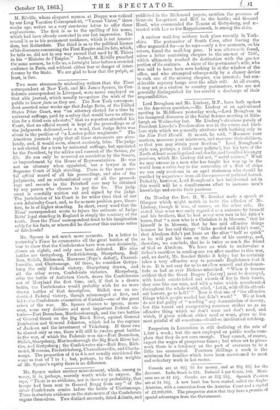Two more strenuously misleading writers than the Times correspondent at
New York, and Mr. James Spence, its Con- federate correspondent in Liverpool, were never employed on that able journal, which usually recognizes the wish of the public to know facts as they are. The Now York correspon- dent asserted some weeks ago that Judge Betts, of the United :States Prize Court, was "an attorney elected for a time by universal suffrage, paid by a salary that would have no attrac- tion for a third-rate advocate," that no reporters attended his Court, that no official record is kept of the proceedings or of the judgments delivered,—in a word, that Judge Betts was about in the position of "a London police magistrate." The American journals reply that all these statements are abso- lutely, and, it would seem, almost anxiously, false. The judge is not elected for a term by universal suffrage, but appointed by the President, by the advice and consent of the Senate, for .life. He can only be removed on conviction by the Senate, or impeachment by the House of Representatives. He was not an attorney when appointed, but a lawyer in the Supreme Court of high standing. There is the most care- iul record of all his proceedings, and also of the judgments, and an authenticated copy of all the proceed- ings and records in the Peterhoff case may be obtained by any person who chooses to pay the fee. The judg- ment is carefully written out and signed by the judge. The jurisdiction of his Court is far wider than that of our own Admiralty Court, and, so far as mere position goes, there- fore, he is of higher standing. In short, every word that the Times' correspondent wrote to injure the estimate of Judge Betts' legal standing in England is simply the contrary of the tenth. Does the Times' correspondent trust to his imagination solely for his facts, or where did he discover this curious series of falsehoods ?






























 Previous page
Previous page